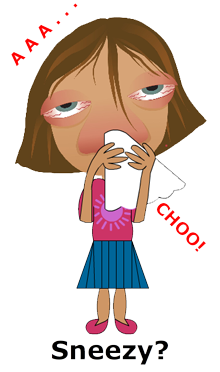|
Allergic rhinitis (Hayfever) occurs when someone reacts to an inhaled allergen by producing a reaction in the nose. The commonest allergies giving allergic rhinitis are allergies to house dust mite or to pollen. Allergic rhinitis is common and affects one in five people. The symptoms of allergic rhinitis include a watery, runny nose, sneezing, a blocked nose and itchy running eyes. Allergic rhinitis typically begins in the teenage years and continues into early adulthood. Some people see an improvement in their symptoms as they get older. Allergic rhinitis can run in families and is more common in people with asthma, eczema or food allergies.
Hayfever is a common term used to describe allergic rhinitis to inhaled pollen from tress and grasses. Pollen is a fine powder produced by trees and plants so that they can fertilise other plants. Grass pollen allergy is the most common cause of hayfever and symptoms are worse in May until July when grass pollen levels are highest. The other common cause of hayfever is tree pollen. Tree pollen is at its highest levels in March until May.
More information available at http://www.rcpch.ac.uk/sites/default/files/2011_RCPCH_Allergy_Allergic%20Rhinitis%20Leaflet%20v4.pdf
Click a button below to access the different areas of rhinitis that are covered in this website:
|

|



